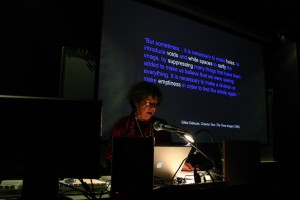Marsha Kinder, founding director of The Labyrinth Project at the University of Southern California, opens the second keynote presentation of the weekend by asking, “What’s at stake?” Narrative, she states, is a cognitive mode in all human societies that we use to contextualize experiences. Cultures are kept alive through open-ended narratives. Each remix of a narrative opens space for the unknown, filters out the unimportant and determines new priorities. Marsha parallels this process with gene splicing – like editing, the remix generates new forms. The more aesthetically and emotionally compelling the narrative is, the better it functions in this cognitive purpose. Death occurs when the narrative reaches closure.
Marsha offers a distinction between ‘database’ and ‘archive.’ Drawing from Lev Manovich, she defines a database as a system enabling fast search and retrieval. An archive, in contrast, is a store of records structured for slow gathering and browsing. Both forms emphasize open narrative.
Citizen Kane, she proposes, can be understood as a database narrative, with the reporter as search engine. As he sorts through stories of Kane’s past, various representations of archives emerge – the Thatcher library and the jigsaw puzzle, for example. Through the film, identity and reality are always multiple, allowing for no singular truth. But at the end of the film, when the meaning of ‘Rosebud’ is revealed, the narrative closes and Kane’s story is locked in his death.
Though differing in style of execution, Chris Marker’s La jetée follows the same structure. Again, a character, the scientist, acts as search engine, and the narrative’s closure is embodied in death. Marsha’s third example is a film titled La niebla en las palmeras, built out of archival photos.
Marsha then introduces her own work with The Labyrinth Project at the University of Southern California. Bleeding Through: Layers of Los Angeles is a database narrative in the form of an interactive installation covering a sixty-six year long story of a fictionalized character named Molly and a possible murder. The database holds material on the ethnically diverse neighbourhood near downtown LA where Molly’s story takes place. Marsha points out that the database format emphasizes the process of selecting data and the implications of these choices. A viewer can choose to either focus on Molly’s story or go further into an ethnographic exploration of the urban environment. Material takes the form of still photos, then-and-now photo pairs, video clips and voice-over narration, shifting across temporal and spatial variables. Removing the constraints of linear storytelling allows the inclusion of characters unrelated to Molly’s story but no less essential in the representation of her neighbourhood. Marsha raises the question, “Who is left out when you create a narrative?”
Another Labyrinth work is Tracing the Decay of Fiction, an interactive exploration of the Hotel Ambassador, a now demolished Los Angeles landmark that played host to several Academy Awards ceremonies, the assassination of Robert F. Kennedy and many entertainment and political celebrities through the twentieth century. The project is structured around the architectural plan of the hotel, and houses about six hours of material. Multiple paths of entry are meant to give viewers the illusion of limitless content.
The third Labyrinth work that Marsha presents is Jewish Homegrown History: Immigration, Identity and Intermarriage, an interactive archive that grows through personal media contributed online by users. Metadata integrates uploaded personal histories with public records, enriching context in both directions and reinforcing known historical narratives, or revealing contradictions and deviations.
Borrowing words from media scholar Patricia Zimmerman, Marsha asserts that we must imagine archives as engines of difference and plurality that can drive us forward. Rather than endings, what we need are new beginnings.






Comments on this entry are closed.